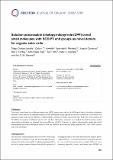Solution processable diketopyrrolopyrrole (DPP) cored small molecules with BODIPY end groups as novel donors for organic solar cells
Abstract
Two novel triads based on a diketopyrrolopyrrole (DPP) central core and two 4,4-difluoro-4-bora-3a,4a-diaza-s-indacene (BODIPY) units attached by thiophene rings have been synthesised having high molar extinction coefficients. These triads were characterised and used as donor materials in small molecule, solution processable organic solar cells. Both triads were blended with PC71BM as an acceptor in different ratios by wt% and their photovoltaic properties were studied. For both the triads a modest photovoltaic performance was observed, having an efficiency of 0.65%. Moreover, in order to understand the ground and excited state properties and vertical absorption profile of DPP and BODIPY units within the triads, theoretical DFT and TDDFT calculations were performed.
Citation
Cortizo-Lacalle , D , Howells , C T , Pandey , U K , Cameron , J , Findlay , N J , Inigo , A R , Tuttle , T , Skabara , P J & Samuel , I D W 2014 , ' Solution processable diketopyrrolopyrrole (DPP) cored small molecules with BODIPY end groups as novel donors for organic solar cells ' , Beilstein Journal of Organic Chemistry , vol. 10 , pp. 2683-2695 . https://doi.org/10.3762/bjoc.10.283
Publication
Beilstein Journal of Organic Chemistry
Status
Peer reviewed
ISSN
1860-5397Type
Journal article
Description
PJS thanks the Royal Society for a Wolfson Research Merit Award.Collections
Items in the St Andrews Research Repository are protected by copyright, with all rights reserved, unless otherwise indicated.

